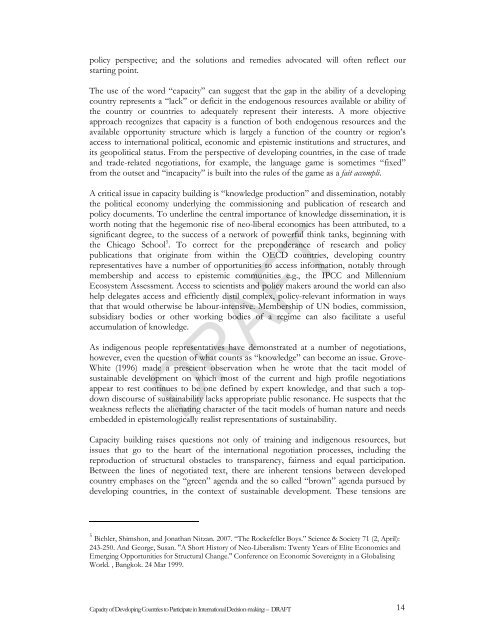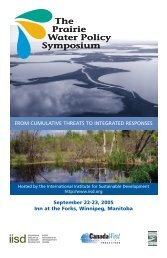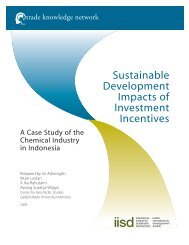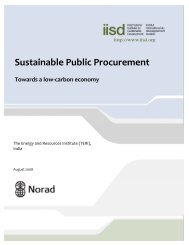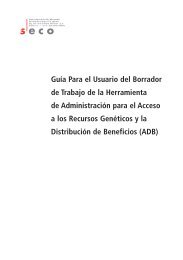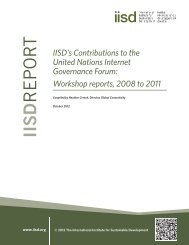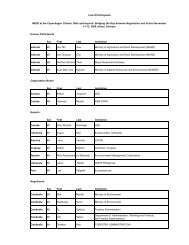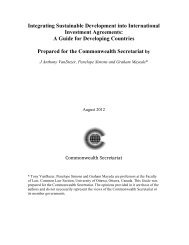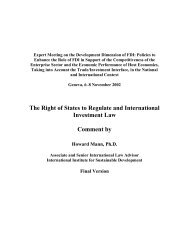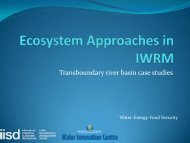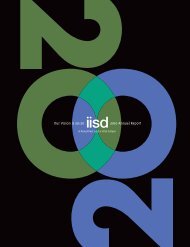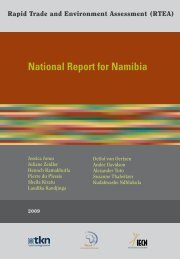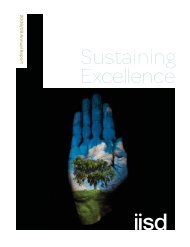Capacity of Developing Countries to Participate in International ...
Capacity of Developing Countries to Participate in International ...
Capacity of Developing Countries to Participate in International ...
You also want an ePaper? Increase the reach of your titles
YUMPU automatically turns print PDFs into web optimized ePapers that Google loves.
policy perspective; and the solutions and remedies advocated will <strong>of</strong>ten reflect our<br />
start<strong>in</strong>g po<strong>in</strong>t.<br />
The use <strong>of</strong> the word “capacity” can suggest that the gap <strong>in</strong> the ability <strong>of</strong> a develop<strong>in</strong>g<br />
country represents a “lack” or deficit <strong>in</strong> the endogenous resources available or ability <strong>of</strong><br />
the country or countries <strong>to</strong> adequately represent their <strong>in</strong>terests. A more objective<br />
approach recognizes that capacity is a function <strong>of</strong> both endogenous resources and the<br />
available opportunity structure which is largely a function <strong>of</strong> the country or region’s<br />
access <strong>to</strong> <strong>in</strong>ternational political, economic and epistemic <strong>in</strong>stitutions and structures, and<br />
its geopolitical status. From the perspective <strong>of</strong> develop<strong>in</strong>g countries, <strong>in</strong> the case <strong>of</strong> trade<br />
and trade-related negotiations, for example, the language game is sometimes “fixed”<br />
from the outset and “<strong>in</strong>capacity” is built <strong>in</strong><strong>to</strong> the rules <strong>of</strong> the game as a fait accompli.<br />
A critical issue <strong>in</strong> capacity build<strong>in</strong>g is “knowledge production” and dissem<strong>in</strong>ation, notably<br />
the political economy underly<strong>in</strong>g the commission<strong>in</strong>g and publication <strong>of</strong> research and<br />
policy documents. To underl<strong>in</strong>e the central importance <strong>of</strong> knowledge dissem<strong>in</strong>ation, it is<br />
worth not<strong>in</strong>g that the hegemonic rise <strong>of</strong> neo-liberal economics has been attributed, <strong>to</strong> a<br />
significant degree, <strong>to</strong> the success <strong>of</strong> a network <strong>of</strong> powerful th<strong>in</strong>k tanks, beg<strong>in</strong>n<strong>in</strong>g with<br />
the Chicago School 5 . To correct for the preponderance <strong>of</strong> research and policy<br />
publications that orig<strong>in</strong>ate from with<strong>in</strong> the OECD countries, develop<strong>in</strong>g country<br />
representatives have a number <strong>of</strong> opportunities <strong>to</strong> access <strong>in</strong>formation, notably through<br />
membership and access <strong>to</strong> epistemic communities e.g., the IPCC and Millennium<br />
Ecosystem Assessment. Access <strong>to</strong> scientists and policy makers around the world can also<br />
help delegates access and efficiently distil complex, policy-relevant <strong>in</strong>formation <strong>in</strong> ways<br />
that that would otherwise be labour-<strong>in</strong>tensive. Membership <strong>of</strong> UN bodies, commission,<br />
subsidiary bodies or other work<strong>in</strong>g bodies <strong>of</strong> a regime can also facilitate a useful<br />
accumulation <strong>of</strong> knowledge.<br />
As <strong>in</strong>digenous people representatives have demonstrated at a number <strong>of</strong> negotiations,<br />
however, even the question <strong>of</strong> what counts as “knowledge” can become an issue. Grove-<br />
White (1996) made a prescient observation when he wrote that the tacit model <strong>of</strong><br />
susta<strong>in</strong>able development on which most <strong>of</strong> the current and high pr<strong>of</strong>ile negotiations<br />
appear <strong>to</strong> rest cont<strong>in</strong>ues <strong>to</strong> be one def<strong>in</strong>ed by expert knowledge, and that such a <strong>to</strong>pdown<br />
discourse <strong>of</strong> susta<strong>in</strong>ability lacks appropriate public resonance. He suspects that the<br />
weakness reflects the alienat<strong>in</strong>g character <strong>of</strong> the tacit models <strong>of</strong> human nature and needs<br />
embedded <strong>in</strong> epistemologically realist representations <strong>of</strong> susta<strong>in</strong>ability.<br />
<strong>Capacity</strong> build<strong>in</strong>g raises questions not only <strong>of</strong> tra<strong>in</strong><strong>in</strong>g and <strong>in</strong>digenous resources, but<br />
issues that go <strong>to</strong> the heart <strong>of</strong> the <strong>in</strong>ternational negotiation processes, <strong>in</strong>clud<strong>in</strong>g the<br />
reproduction <strong>of</strong> structural obstacles <strong>to</strong> transparency, fairness and equal participation.<br />
Between the l<strong>in</strong>es <strong>of</strong> negotiated text, there are <strong>in</strong>herent tensions between developed<br />
country emphases on the “green” agenda and the so called “brown” agenda pursued by<br />
develop<strong>in</strong>g countries, <strong>in</strong> the context <strong>of</strong> susta<strong>in</strong>able development. These tensions are<br />
5 Bichler, Shimshon, and Jonathan Nitzan. 2007. “The Rockefeller Boys.” Science & Society 71 (2, April):<br />
243-250. And George, Susan. "A Short His<strong>to</strong>ry <strong>of</strong> Neo-Liberalism: Twenty Years <strong>of</strong> Elite Economics and<br />
Emerg<strong>in</strong>g Opportunities for Structural Change." Conference on Economic Sovereignty <strong>in</strong> a Globalis<strong>in</strong>g<br />
World. , Bangkok. 24 Mar 1999.<br />
<strong>Capacity</strong> <strong>of</strong> <strong>Develop<strong>in</strong>g</strong> <strong>Countries</strong> <strong>to</strong> <strong>Participate</strong> <strong>in</strong> <strong>International</strong> Decision-mak<strong>in</strong>g: – DRAFT 14


